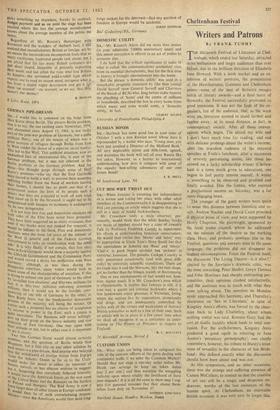Cheltenham Festival
Writers and Patrons
By FRANK TUOHY rr HE thirteenth Festival of Literature at Chet- '. tenham, which ended last Saturday, attracted more enthusiasm and larger audiences than ever before, due to the brilliant direction of Elizabeth Jane Howard. With a book market and an ex- hibition of writers' portraits, the presentation of the Hawthornden, Guinness and Cheltenham prizes—some of the best of Britain's meagre batch of literary awards—and a final burst of fireworks, the Festival successfully promoted its good intentions. It was not the fault of the or- ganisers, but of the audience, that, as the week wore on, literature seemed to stand farther and farther away: at its usual distance, in fact, in contemporary society. After all those conver- sations which begin, 'I'm afraid my wife and I don't have much time for reading,' and end with delicate probings about the writer's income; after the truculent rudeness of the mayoral speeches at Foyle's luncheon; after a succession of severely patronising smiles, like those be- stowed on a lucky scholarship winner (Chelten- ham is a town much given to education), one began to feel pretty remote oneself. A writer is something to be observed and prodded and finally avoided. Elsa the lioness, who enjoyed a posthumous success on Saturday, was a far more engaging beast.
The younger of the guest writers were quick to sense this distance between intention and re- sult. Andrew Sinclair and David Caute provided
sekialist point of view, and were supported by Henry Chapman, the playwright, sponsored by the local trades council, whom he addressed on the relation of the theatre to the working class. Here, and probably nowhere else in the Festival, questions and answers were in the same language; the problems did not disappear in mutual misconceptions. From the Festival itself, the discussion 'The Living Theatre—is it alive?,' chaired by the Spectator's dramatic critic, was the most rewarding. Peter Shaffer, Gwyn Thomas and John Mortimer had sharply contrasting per- sonalities, their opinions clashed satisfactorily, and the audience was in touch with what they were talking about. The novelists on Monday. never approached this harmony, and Thursday's discussion on 'Sex in Literature,' in spite of Kingsley Amis's efforts, was forced by the chair- man back to Lady Chatterley, about whom nothing useful was said. Domain Gary had the sort of Gallic lucidity which leads to total con- fusion. For the sixth-formers, Kingsley Amis produced a good squib in referring to Jane Austen's 'pecuniary pornography'; one chiefly remembers, however, his tribute to Hardy's treat- ment of sexuality in the character of Sue Bride- head: this defined exactly what the discussion should have been about and was not.
At this symposium, and on other occasions, there was the strange and suffering presence of Carson McCullers, to remind us that the creation of art can still be a tragic and desperate en- deavour, worthy of the last resources of the human spirit. At Cheltenham, an enjoyable British occasion, it was very easy to forget this.






































 Previous page
Previous page